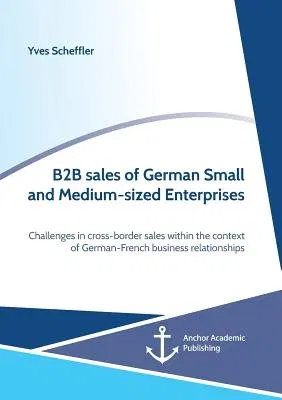For decades Germany and France have been forming the core of the
European Union. They generate about 40 per cent of total economic output
in the Euro Zone. Nowhere else, there does exist such an intense
relationship between neighbouring economies like between these two
countries. Those links go far beyond external trade relations and are
targeted towards mutual business cooperation. In the light of
globalisation, a rising number of competitors, increasing customer
demands and short product life cycles, cross-national commerce are of
great importance for German Small and Medium-sized Enterprises (SMEs) -
particularly in the B2B sector. Sales is often tagged as an enterprise's
figurehead. It is responsible for determining whether a manufacturer
effectively conveys its capabilities to the B2B customer. To date, there
exists no single reference book covering all four topics of this paper's
headline: B2B, SMEs, sales and Franco-German business relationships. The
ongoing literature is mainly focussed on large firms. The subject of
international sales has hardly been investigated, yet. Apart from the
sales excellence approach, there are few selling models for corporate
practice. The lack of sales expertise both in theory and practise is
thus not the ideal prerequisite for succeeding on a cross-border scale.
This study addresses sales challenges of German SMEs with its trading
partner France in the B2B sector. It should be stressed that the focus
is on SMEs from Germany only. The company size of French business
partners does not play a role in this context. The acquisition-related
part of sales (selling) is highlighted while the physical component
(distribution) is secondary within the framework of this assignment. In
consequence, the central question is to figure out what kind of
challenges German SMEs must face when exerting B2B sales activities in
France. A related sub-issue is defined as follows: "Which type of
challenge has the greatest impact on cross-border sales


